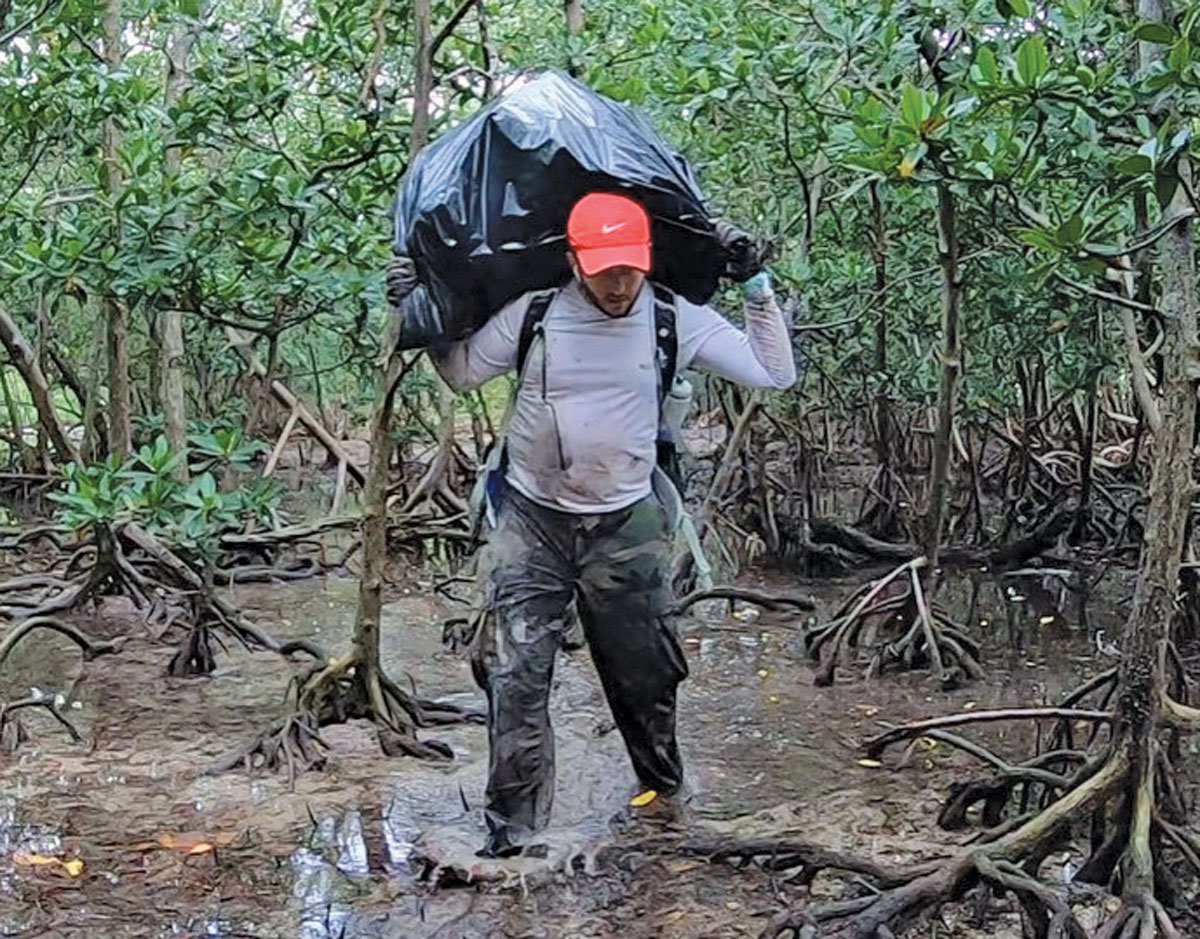
I’ve spent the last seven years removing 27,690 pounds of trash from South Florida’s mangrove swamps. In 2019, I walked (more like stumbled in a pain-induced fugue state) the Miami Marathon carrying 35 pounds of mangrove trash. That pack now sits in the HistoryMiami Museum.
I don’t have a nonprofit. I’m literally just a guy with a weird hobby. That’s what I tell people. It’s what I tell journalists, influencers, politicians, and anyone else who asks. It’s what I show whoever stumbles across the videos I post on social media. I clean the mangroves because I love them. The end. Don’t think about it too hard.
But that’s not nearly the full story.
There’s so much people don’t see in the videos I post. These are highlight reels—the most telegenic snippets of footage I record—perhaps a minute of clips curated from five, or eight, or 12 hours of backbreaking work. The vast majority of that effort is mind-numbingly boring—or so it would appear to anyone creeping on me from the woods. It mostly entails me methodically picking up trash and placing it in bags for hours on end while listening to music. I enter a flow state where I must periodically remind myself to drink water and eat food to stave off dehydration and heat exhaustion.
I also grunt, and curse, and crane my neck skyward and scream without an iota of self-consciousness. I scream in pain, and frustration, and anger. Deep, primal yells you’ve never heard in your quotidian life of concrete and asphalt because it would terrify every civilized person for blocks around. But the mangroves don’t mind in the slightest. They absorb my screams like so much storm surge. My outbursts don’t even fluster nearby tree crabs clambering around the tangle of roots and fallen trees.
I scream in pain. I scream when I step on a rusted nail embedded in a wooden palate. I scream the innumerable times I sprain my back, and ankles, and shoulders, and neck, and wrists. I scream when an unseen piece of glass, or metal, or dead branch lacerates or punctures some part of me, mixing blood with the muck splattered across my body.
I scream in frustration. I scream because an enormous tire, or crab trap, or jumble of marine rope won’t budge from the mud that swallowed it years ago. I scream because if I don’t pull it out of that unyielding filth, no one will. I scream because I shouldn’t have to do this—someone else should, someone in authority, not some random man in camo pants without a government pension or affiliated nonprofit.
I scream in anger. I scream because things shouldn’t be this way. I scream because illegal dumpers and squatters desecrate what should be pristine protected environments. I scream because immeasurably powerful forces—multinational corporations and the political class that enable them—pump megatons of toxic materials into the ocean and I, along with a few others, pay with our bodies to clean up the mess they create and continue to profit from.
I also scream in triumph. I scream when I drag, and roll, and hoist, and lift some massive piece of trash that seemed unyielding, impossible to remove much less transport across miles of snarled roots, sucking mud, and waist-deep water. I scream because I occasionally attain small victories most rational people would never even attempt. But I’m not being rational. I’m angry, and frustrated, and in pain, and that fuels me to move the immovable for no one but myself and the mangroves I love.
Everyone should be given the opportunity to shout at the unfairness, and injustice, and anxiety, and evil in the world, but polite society ensures we don’t. Luckily for me, polite society doesn’t wade into the muck where I work. It’s miles away policing and judging your insecurities. And so, the mangroves allow me to yell to my heart’s content. I then smile, hoist a 40-pound bag onto my shoulders, and keep moving until my next opportunity to scream arises.
There’s meaning in ritual.
I learned this from a lifetime of Catholic school but didn’t understood what it meant until recently. The Eucharist, baptism, confirmation—these centuries-old traditions never made an impression. They seemed meaningless gestures, hollow motions celibate men in frocks insisted were universal. I still don’t really connect with structured religious practices, but I now deeply, viscerally understand the importance of ritual.
My work in the mangroves does nothing in a practical sense to solve the global problem of marine pollution any more than eating a small wafer dispels the evil afflicting the world. The 27,690 pounds of trash I collected is not even a rounding error when compared to the 8.3 million tons of plastic dumped into the ocean on an annual basis. In a sense, my efforts are meaningless. Less than a drop in the bucket. Pure, Sisyphean futility.
But it is deeply meaningful to me.
This is my ritual. It entails me raising my miniscule, insignificant voice arrayed against unstoppable, impersonal, malicious forces and screaming, “NO! I don’t care what the odds are! I don’t care that my work will never end! I don’t care that I can keep doing this until my body fails! I won’t stop until I’m physically incapacitated and there’s nothing anyone anywhere can do about it!”
The ritual might not matter on a global scale, but it is my willful stubbornness and drive made manifest, and that means everything to me.
The mangroves take much from me. I am constantly injured—a state that will only worsen as I age. There are times I come home when I can barely walk for days. But the mangroves give so much more. My work isn’t just about the satisfaction of seeing the immediate fruits of my labor. It isn’t just about helping sensitive habitats I adore or teaching others about their importance or the threats they face.
I do my work because of its intrinsic pain, and anger, and frustration, and triumph, and cathartic release of all the above. I do it because of the deep meaning in the ritual. I do it for the mangroves, but I also do it for myself.
If you like our stories, buy our book!
